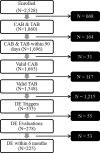Screening by telephone in the Alzheimer's disease anti-inflammatory prevention trial
- PMID: 23645097
- PMCID: PMC3913728
- DOI: 10.3233/JAD-130113
Screening by telephone in the Alzheimer's disease anti-inflammatory prevention trial
Abstract
Compared with in-person assessment methods, telephone screening for dementia and other cognitive syndromes may improve efficiency of large population studies or prevention trials. We used data from the Alzheimer's Disease Anti-Inflammatory Prevention Trial to compare performance of a four-test Telephone Assessment Battery (TAB) that included the Telephone Interview for Cognitive Status (TICS) to that of a traditional in-person Cognitive Assessment Battery. Among 1,548 elderly participants with valid telephone and in-person screening results obtained within 90 days of each other, 225 persons were referred for a full cognitive diagnostic evaluation that was completed within six months of screening. Drawing on results from this panel of 225 individuals, we used the Capture-Recapture method to estimate population numbers of cognitively impaired participants. The latter estimates enabled us to compare the performance characteristics of the two screening batteries at specified cut-offs for detection of dementia and milder forms of impairment. Although our results provide relatively imprecise estimates of the performance characteristics of the two batteries, a comparison of their relative performance suggests that, at selected cut-off points, the TAB produces results broadly comparable to in-person screening and may be slightly more sensitive in detecting mild impairment. TAB performance characteristics also appeared slightly better than those of the TICS alone. Given its benefits in time and cost when screening for cognitive disorders, telephone screening should be considered for large samples.
Figures


Similar articles
-
Results of a follow-up study to the randomized Alzheimer's Disease Anti-inflammatory Prevention Trial (ADAPT).Alzheimers Dement. 2013 Nov;9(6):714-23. doi: 10.1016/j.jalz.2012.11.012. Epub 2013 Apr 3. Alzheimers Dement. 2013. PMID: 23562431 Free PMC article. Clinical Trial.
-
The use of the Modified Telephone Interview for Cognitive Status (TICS-M) in the detection of amnestic mild cognitive impairment.J Geriatr Psychiatry Neurol. 2009 Jun;22(2):103-9. doi: 10.1177/0891988708328214. J Geriatr Psychiatry Neurol. 2009. PMID: 19417219 Free PMC article.
-
Cognitive function over time in the Alzheimer's Disease Anti-inflammatory Prevention Trial (ADAPT): results of a randomized, controlled trial of naproxen and celecoxib.Arch Neurol. 2008 Jul;65(7):896-905. doi: 10.1001/archneur.2008.65.7.nct70006. Epub 2008 May 12. Arch Neurol. 2008. PMID: 18474729 Free PMC article. Clinical Trial.
-
Cognitive screening and neuropsychological assessment in early Alzheimer's disease.Clin Geriatr Med. 2001 May;17(2):229-54. doi: 10.1016/s0749-0690(05)70067-7. Clin Geriatr Med. 2001. PMID: 11375134 Review.
-
Reliability of Telephone and Videoconference Methods of Cognitive Assessment in Older Adults with and without Dementia.J Alzheimers Dis. 2021;81(4):1625-1647. doi: 10.3233/JAD-210088. J Alzheimers Dis. 2021. PMID: 33967052 Review.
Cited by
-
Optimizing mobile cognitive assessment reduces administration time while maintaining screening accuracy in older adults.Sci Rep. 2025 Aug 19;15(1):30356. doi: 10.1038/s41598-025-14130-9. Sci Rep. 2025. PMID: 40830390 Free PMC article.
-
Patient Satisfaction with Telephone Neuropsychological Assessment.Arch Clin Neuropsychol. 2020 Nov 19;35(8):1240-1248. doi: 10.1093/arclin/acaa097. Arch Clin Neuropsychol. 2020. PMID: 33124648 Free PMC article.
-
Development of a screening algorithm for Alzheimer's disease using categorical verbal fluency.PLoS One. 2014 Jan 2;9(1):e84111. doi: 10.1371/journal.pone.0084111. eCollection 2014. PLoS One. 2014. PMID: 24392109 Free PMC article.
-
Brief Report: Using the Internet to Identify Persons with Cognitive Impairment for Participation in Clinical Trials.Brain Sci. 2017 Apr 5;7(4):36. doi: 10.3390/brainsci7040036. Brain Sci. 2017. PMID: 28379188 Free PMC article.
-
Cognitive Assessment via Telephone: A Scoping Review of Instruments.Arch Clin Neuropsychol. 2020 Nov 19;35(8):1215-1233. doi: 10.1093/arclin/acaa096. Arch Clin Neuropsychol. 2020. PMID: 33106856 Free PMC article.
References
-
- Sperling RA, Aisen PS, Beckett LA, Bennett DA, Craft S, Fagan AM, Iwatsubo T, Jack CR, Jr., Kaye J, Montine TJ, Park DC, Reiman EM, Rowe CC, Siemers E, Stern Y, Yaffe K, Carrillo MC, Thies B, Morrison-Bogorad M, Wagster MV, Phelps CH. Toward defining the preclinical stages of Alzheimer's disease: recommendations from the National Institute on Aging-Alzheimer's Association workgroups on diagnostic guidelines for Alzheimer's disease. Alzheimers Dement. 2011;7:280–292. - PMC - PubMed
-
- Wolfson C, Kirkland SA, Raina PS, Uniat J, Roberts K, Bergman H, Furlini L, Pelletier A, Strople G, Angus CL, Keshavarz H, Szala-Meneok K. Telephone-administered cognitive tests as tools for the identification of eligible study participants for population-based research in aging. Canadian Journal on Aging-Revue Canadienne Du Vieillissement. 2009;28:251–259. - PubMed
-
- Lewis B, Mills C, Mohs R, Hill J, Fillit H. Improving early recognition of Alzheimer's disease: A review of telephonic screening tools. Journal of Clinical Outcomes Management. 2001;8:41–45.
-
- Nesselroade JR, Pedersen NL, Mcclearn GE, Plomin R, Bergeman CS. Factorial and criterion validities of telephone-assessed cognitive-ability measures - age and gender comparisons in adult twins. Res Aging. 1988;10:220–234. - PubMed
Publication types
MeSH terms
Substances
Grants and funding
LinkOut - more resources
Full Text Sources
Other Literature Sources
Medical

